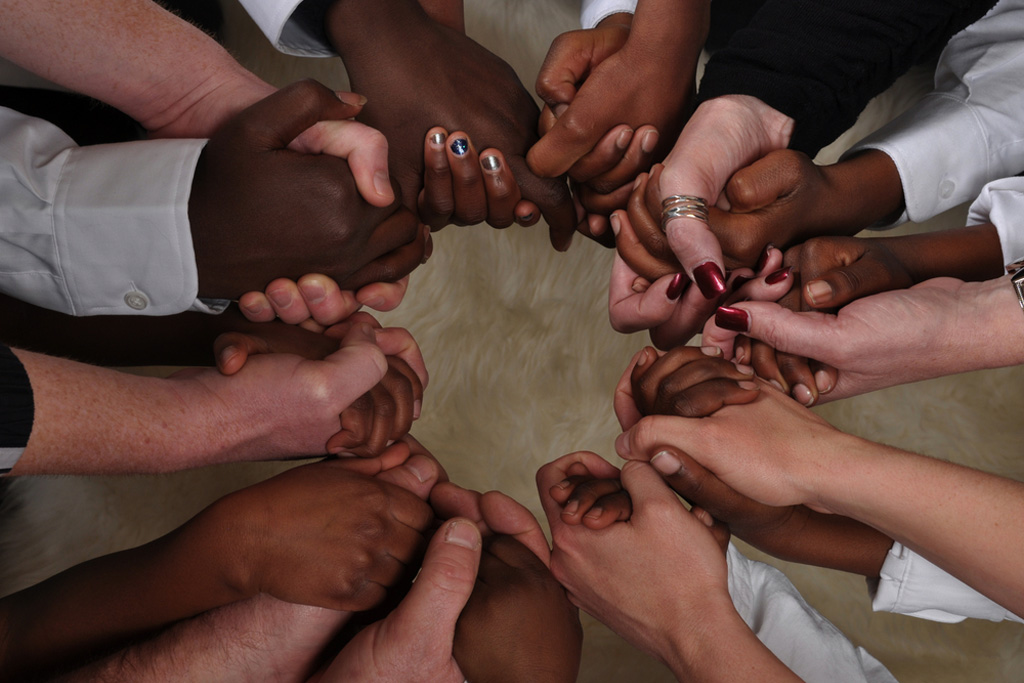What is happiness? Cultural answers constantly change as society evolves. In the 1950’s and ’60s, it was having the security of a “good job”; in the ’70s, the counterculture revolution told us it was enlightenment and self-improvement that we needed. The ’80s said, “Greed is good” as we swung towards a more materialistic definition of happiness. Now, the surprising popularity of books like Thomas Moore’s The Care of the Soul seems to indicate that we are once again looking to spiritual values as the source of true happiness. Happiness is a subjective state, so it can be hard to define. Despite the changing fashions of cultural definitions, there are some basic components: we all want to feel loved and connected to other people; we want to feel safe from harm; and we want to have a sense of purpose.
Contrary to what you might think, happiness comes from:
What kind of person you are, not what you have. Liking yourself is the core of happiness. Qualities of kindness, humor, self-esteem and integrity make like more enjoyable, but all the wealth in the world can’t make a self-centered, angry, cynical person happy.
Frequency of pleasant experiences rather than the intensity. Big events such as marriage, a job promotion, and the birth of a child only happen a few times in life. Woven together by the texture of daily like, a few intensely happy events can’t outweigh lots of unhappy ordinary days.
Realistic expectations about yourself and life. If your definition of happiness depends on everything in your life going smoothly, you’ll probably be unhappy. We must learn to make realistic compromises with what life brings.
Behavioral studies reveal some additional conclusions about happiness. The three most frequent answers given in response to the question “What makes you happy?” were:
· Close relationships
· A happy marriage
· Religious faith of any kind
All of these items include other people, whether it is friends, children, spouses or a deity. To understand happiness, we must acknowledge how important others are to the enjoyment of life.
CREATING HAPPINESS
Research shows that contrary to popular belief, external circumstances such as wealth or social status have little effect on happiness. It is how you look at life that fosters happiness, and this is learned early.
Happy parents not only pass on the personal traits that contribute to happiness, they also provide positive role models by creating little, daily experiences of happiness. This kind of childhood experience creates the expectation of happiness and, as adults, we create what we expect.
Unhappy parents beget unhappy children. When parents seek counseling their children also benefit, since as parents become happier, children feel happier and more secure, too. They can simply enjoy being kids, secure in the knowledge that someone else has responsibility for helping their parents. They also learn important lessons from their parents’ example: that problems can be solved and people can change.
When unhappy parents don’t seek help, their children conclude that nothing can be done about unhappiness. They grow up angry and resentful or depressed and helpless, duplicating the parents’ unhappy lives in new settings. Since children see everything in terms of themselves, they may blame themselves for their parents’ unhappiness. They may try to “fix” it by being the “good child” or provide a distraction in the form of a “problem child.”
There is help for unhappiness, and it starts with identifying the source. Much unhappiness comes from a failure to recognize what you really want. It’s normal (but unsatisfying) when you’re unhappy to borrow other people’s definition of happiness, thinking that if you emulate someone who seems to be happy, and then you’ll be happy too.
Of course, this rarely works because the void you feel can only be filled by what you need. If you feel unloved by your spouse, no amount of power or possessions will make you happy. If you don’t like yourself, others’ affection won’t change that.
While some unhappiness is undoubtedly created by present circumstances, when your feelings seem too intense for the situation, you can bet that childhood experiences are a factor. The pain of the current situation reactivates painful feelings from the past that have been sealed over, but not healed. Whenever something bumps against them, they hurt all over again.
It’s the emotional equivalent of the cowboy shot by the Indian’s arrow. He broke off the arrow shaft and bandaged the wound. In time, the wound healed but the arrowhead remained inside. Whenever something brushed against the spot, it hurt. He eventually forgot what caused the pain, even though he continued to protect the wound. Had a doctor removed the arrowhead, the wound could have healed without residual pain.
When the source of unhappiness lies far back in childhood, it’s difficult to identify without professional help. A counselor can help you trace the patterns of your life back to their source so you can truly resolve your pain. Once you know what’s missing from your life, you can tackle changing it. Even though you may have to confront painful feelings, it is better than the dull ache of constant unhappiness.
QUALITIES OF A HAPPY WORK ENVIRONMENT
Being happy at work requires more than a salary and benefits. People report greater job satisfaction from non-material rewards such as a sense of identity, community and purpose than from salary. Trusting the people you work with is characteristic of good workplaces.
Happy workplaces also include qualities such as …
Friendliness – Employees enjoy camaraderie with each other and comfortably interact with all levels of management in a pleasant environment.
Lack of Office Politics – When employees work together as a team, they don’t resort to manipulation to advance themselves or to gain favor with upper management.
Fairness – Employees can express grievances and concerns without jeopardizing their jobs; they don’t feel like the company takes advantage of them.
Meaningful Work – When employees are involved in defining their goals and making decisions, they tend to think of their work as “more than a job.”
Family atmosphere – Happy companies provide an environment that cares about the needs of individual workers and nurtures their talents. The camaraderie of being part of a team makes employees feel like they are the company.
RAISING HAPPY CHILDREN
In a survey, children were asked what they thought made a happy family. The most frequent answer was doing things together.
Parents can’t give self- confidence to children, but we can help foster their sense of self-worth. Following are a few things we can do to help children feel healthy and positive about themselves…
· Time: Children regard the presence of their parents as a visible symbol of caring that is far more significant than material objects. Time spent together doesn’t require elaborate activities; taking a family walk or having dinner together serves the same purpose.
· Respect: Don’t burden children with your unrealized dreams. Encourage them to follow their own interests and to do their best at whatever they choose.
· Love: Give your children unconditional love. Love them for who they are, not what they can accomplish. If you praise only their accomplishments, they may think that’s the only value they have.
· Consistency: Keep the same rules from one day to the next so that your children will know what’s expected of them. Teach them to accept responsibility for their behavior. Help them understand that their actions affect everyone in the family.
· Be a Positive Role Model: Children learn from observing their parents. If parents aren’t happy, children will sense it. Parents who take care of their own needs teach children self-respect and self-care.
HOW TO BE HAPPY EVERY DAY
There’s never yet been anyone who on his deathbed said, “Gosh, I wish I’d spent more time at the office.” There have, however, been plenty of people who’ve said, “I wish I’d taken time to enjoy life more. Here are some hints for being happier every day.
Learn to enjoy wherever you are at any given point in time. Too often, we miss the pleasure of the moment because we’re fussing about the past or worrying about the future, or waiting for some special person or event to “make” us happy.
In a 1994 survey, 40% of the respondents reported always feeling rushed for time. Rushing becomes a habit rather than a response to a specific situation. You’ll feel happier and still accomplish your goals if you talk slower, walk slower, drive slower, etc.
Real happiness comes from quality of life, not quantity. Taking the time to identify what you really want at any given time will bring much more pleasure than just having “more”. When you’re really hungry for fish, all the steak in the world won’t satisfy you.
It’s hard to live with yourself when you violate your principles. You will have to live with yourself 24 hours a day for the rest of your life. Without integrity, those days can be very long. Follow your conscience and regardless of the circumstances of your life, you’ll be happier.
Resentments and grudges kill happiness. Write down all your old grievances, resentments and anger at others and then burn the paper or throw it away. Then you can start being happy without the weight of the past hanging around your neck.
Finding the humor in everyday occurrences is one of the small happinesses available to all of us every day. Learn to laugh at yourself and to look at the humorous side of things instead of getting angry about situations you can’t change.
You can’t be happy if you just allow life to “happen” to you. Take control of setting goals for your life and take responsibility for your decisions. You’ll enjoy your victories more because you’ll know that you created them, not luck.
Loving relationships are the foundation of happiness. Make time every day to nurture those loving relationships. Celebrations of successes are made richer by sharing them with those we love, and life’s burdens become lighter when they’re shared.
Misconceptions
Many of the popular misconceptions about happiness have been disproved by behavioral research. For example:
Myth: Teens and the elderly are less happy than other age groups.
Fact: Happiness between various age groups differs very little.
Myth: Money can buy happiness.
Fact: while the absence of money can make you miserable, it doesn’t automatically bring happiness. One-third of the wealthiest Americans are less happy than the average person.
Myth: Past generations were happier.
Fact: People today are as happy as their parents’ generation. However, today’s unmarried men and women report feeling happier than their counterparts in the past.
ARE YOU UNHAPPY?
It’s unfortunate, but true, that we can grow used to living with unhappiness. People who don’t believe that people can change and who don’t feel in charge of their lives may become so accustomed to being unhappy that they don’t recognize it. They indulge in distracting or even self-destructive activities to keep themselves from knowing how they feel.
If you find yourself doing the following things, you may want to stop and ask yourself what you’re running away from:
· Eating or drinking too much
· Over-spending and/or spending to cheer yourself up
· Having extramarital affairs
· Being promiscuous and/or having unsafe sex
· Spending most of your time daydreaming
· Feeling frustrated and/or angry most of the time
· Being unable to enjoy solitude
· Keeping a frantic social pace
· Chronic cynicism and/or pessimism




